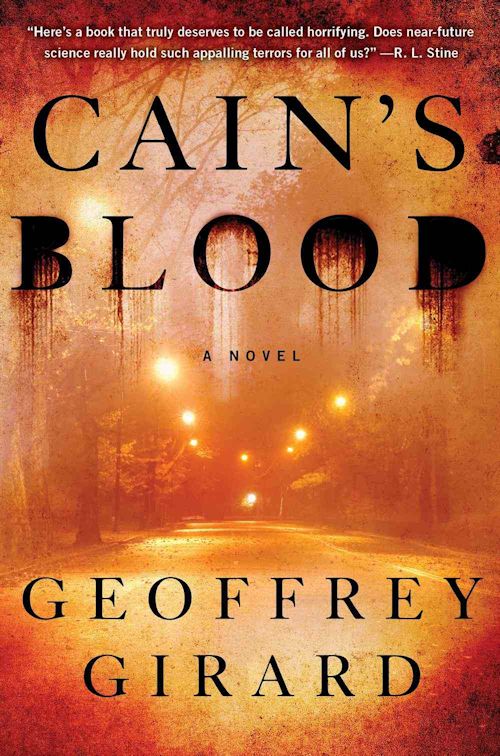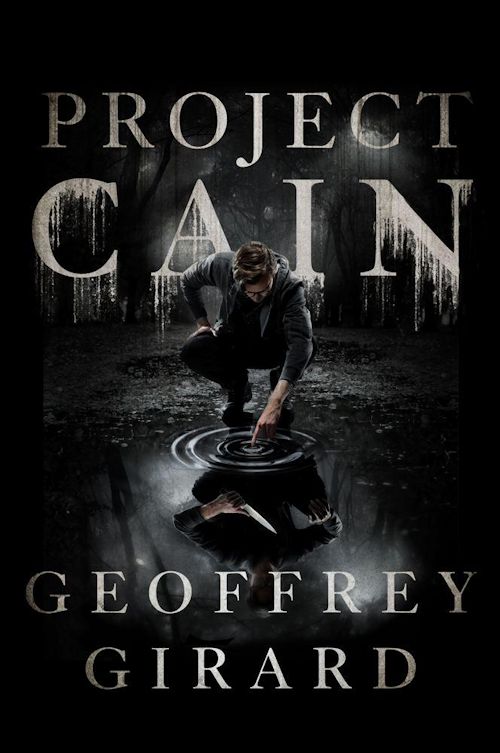Please welcome Geoffrey Girard to The Qwillery as part of the 2013 Debut Author Challenge Guest Blogs. Cain's Blood will be published on September 3, 2013. At the same time a YA companion novel, Project Cain, will also be published.

The popularity of serial killers in fiction is at an all-time high. From a dozen different television programs to the latest movie or best-seller list, you’re gonna find a prototypical serial killer: middle-aged white guy who’s knowledgeable, clever, eccentric, and just doesn’t give a damn whether you live or die.
I have two books with serial killers coming out this Fall: CAIN’S BLOOD (a techno thriller) and PROJECT CAIN (an accompanying spinoff novel for teens). In both, I spend time with some of the most infamous serial killers in American history (Bundy, Gacy, Dahmer, etc.) and their teenaged counterparts (clones). While researching and writing the books, I was mostly focused on the lives of these men and the possible science/causes behind their crimes. I never really stopped to think Why folk (including me) were so interested in these tales. Now that I’ve started promoting the books, however, I’ve gotten the “Why do we seem to like serial killers so much” question enough that I had to think about that Why some and jot down some thoughts here.
1] The early/quick answer is morbid curiosity: the same reason we check out traffic accidents, gape at Holocaust footage, and spend our dollars on slasher films and novels. Our macabre and innate fascination with someone else’s demise. We all know we’re gonna die eventually, so watching some other poor guy go down crowns the King of all Schadenfreude. And fiction makes this dark pursuit even more enjoyable because it’s, well, fiction. No one really got hurt. Right?
2] Serial killers are the monsters among us. High estimates suggest that as many as 4% of Americans are sociopaths; those who just don’t care about the feelings, needs or lives of others. That’s twelve million people. Are they all serial killers, of course not. Most, 98%, are just self-centered jerks, leaving only 2% of those twelve million as violent murder-ready souls. But that’s, um, 240,000 Americans. Maybe we’ll go with the lowest estimates, and it’d be only 40,000 Americans capable of murdering without a second thought. Better? And the really interesting/horrifying part is that they look exactly like everyone else. No long dripping fangs or hockey masks or green scales. Most are men, and that’s half the people you know. Neighbor, coworker, husband, classmate. The sun or a bucket of water won’t make these guys melt away. They’re real, and here, and you just might have passed one today. And it’s that possibility that makes them very interesting, indeed.
3] Serial killers may be our vampire. In 1897, Stoker’s Dracula was largely a response to fifty years of Victorian behavior control. At the peak of this sexually suppressed/repressed culture, came a romanticized being who screwed for fun and flung and spilled hot fluids better than a Nickelodeon game show. The last twenty years in the United States have produced similar cultural changes. From the workplace to the classroom, we don’t seem to have rules anymore – we just have referees. Our language and personal exchanges are largely controlled now by human resource memos, lawsuit-leery administrators, and the PC mob whose good intentions sometimes trample common sense. In reply, the serial killer: A romanticized being who doesn’t give a rat’s ass about the right things to say or do. Living beyond Good or Evil in world nervous about what to say to someone during Christmas. A tragic hero, of sorts, for our existential age. In traditional Tragedy, the hero is the one at odds with society because he/she doesn’t fit the system and is fighting to secure their rightful station in the world. Yes, these men are bad. But they’re bad in a way we just maybe admire. Or, at least, “understand.”
Add it all up, and you get a lethal invisible fantasy imbued with smarts and style far beyond the real-life version. Fiction’s good at that. So these specific monsters likely aren’t going anywhere for a long, long while…
About Cain's Blood
Cain's Blood
Touchstone, September 3, 2013
Hardcover and eBook, 352 pages

Ted Bundy. The Son of Sam. The Boston Strangler. Albert Fish. Henry Lee Lucas.
The DNA of the world’s most notorious serial killers has been cloned by the U.S. Department of Defense to develop a new breed of bioweapon. Now in Phase Three, the program includes dozens of young men who have no clue as to their evil heritage. Playing a twisted game of nature vs. nurture, scientists raise some of the clones with loving families and others in abusive circumstances. But everything changes when the most dangerous boys are set free by their creator. A man with demons of his own, former black ops soldier Shawn Castillo is hot on their trail. But Castillo didn’t count on the quiet young man he finds hiding in an abandoned house—a boy who has just learned he is the clone of Jeffrey Dahmer. As Jeffrey and Castillo race across the country on the trail of the rampaging teens, Castillo must protect the boy who is the embodiment of his biggest fears—and who may also be his last hope. Melding all-too-plausible science and ripped from- the-headlines horror, Cain’s Blood is a stunning debut about the potential for good and evil in us all.
Amazon : Barnes and Noble : Book Depository : Books-A-Million : IndieBound
Project Cain
Simon & Schuster Books for
Young Readers, September 3, 2013
Hardcover and eBook, 368 pages

Jeff discovers he’s a serial killer clone—and he’s got to track down others like him before it’s too late. A thrilling YA companion to S&S Touchstone’s Cain’s Blood, releasing simultaneously.
This dark, literary thriller is a story about blood: specifically, the DNA of the world’s most notorious serial killers, captured and cloned by the Department of Defense to develop a new “breed” of bio-weapons. The program is now in Stage Three—with dozens of young male clones from age ten to eighteen kept and monitored at a private facility without any realization of who they really are. Some are treated like everyday kids. Others live prescribed lives to replicate the upbringing of their DNA donors. All wonder why they can’t remember their lives before age ten.
When security is breached and the most dangerous boys are set free by the now-insane scientist who created them, only one young man can help find the clones before their true genetic nature grows even more horrific than the original models: a fifteen-year-old boy, an every-boy…who has just learned that he is the clone of Jeffrey Dahmer.
Amazon : Barnes and Noble : Book Depository : Books-A-Million : IndieBound
About Geoffrey

Geoffrey Girard writes thrillers, historicals, dark fantasy, young adult novels, and short speculative fiction for publications including WRITERS OF THE FUTURE and the recent Stoker-nominated DARK FAITH anthology. Born in Germany and shaped in New Jersey, Geoffrey graduated from Washington College with a literature degree and worked as an advertising copywriter and marketing manager before shifting to high school English teacher. Since, he's earned an MA in Creative Writing from Miami University and is the Department Chair of English at a private boys' school in Cincinnati. Simon and Schuster will publish two Girard novels in Fall, 2013: CAIN'S BLOOD, a techno thriller, and PROJECT CAIN, a spinoff novel for Young-Adult readers. For more information, visit www.GeoffreyGirard.com.
Website ~ Twitter @Geoffrey_Girard ~ Facebook








